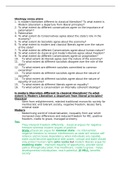Essay
POLITICS IDEOLOGY ESSAY PLANS (SOCIALISM, LIBERALISM, CONSERVATISM)
- Vak
- Instelling
Contains detailed 15 essay plans for quick revision. Includes for and against points for each essay question with key thinkers included. Perfect for any spec, especially EDEXCEL
[Meer zien]







